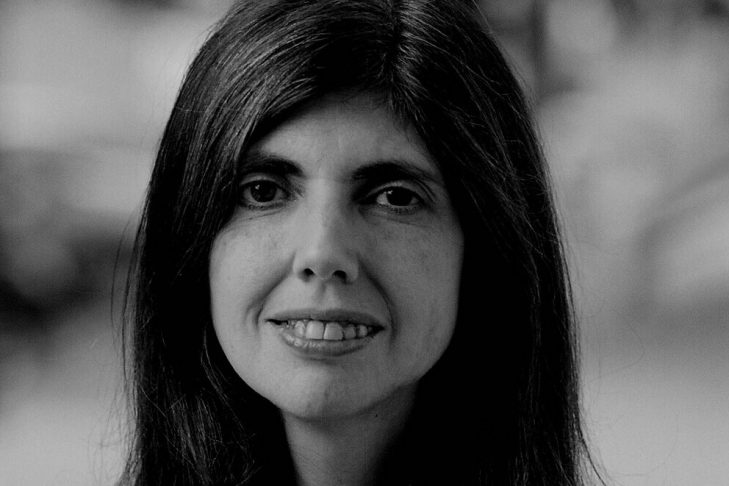Lucette Lagnado, a reporter for The Wall Street Journal and author of two acclaimed memoirs about her Mizrahi family’s exodus from Egypt, died on July 10 at the age of 62.
Lagnado and her family fled to the United States through Paris when she was 6 years old. She recalled her family’s exile from Cairo in her first memoir, “The Man in the White Sharkskin Suit: A Jewish Family’s Exodus from Old Cairo to the New World.” The book, which won the Jewish Book Council’s Sami Rohr Prize for Jewish Literature in 2008, focused on Lagnado’s father, Leon, a man who strolled the streets of Cairo in his white sharkskin suit. Referred to as “The Captain,” the debonair Leon was friendly with British soldiers, frequented nightclubs where he played cards with King Farouk, and eventually swept Lagnado’s much-younger mother off her feet.
While Leon was dazzling and memorable, the book’s brilliance rested on Lagnado’s uncanny ability to bring forward the emotional and often devastating effects of being forced to leave your homeland. Lagnado wrote how Egypt’s dictator, Gamal Nasser, made life impossible for Egypt’s Jews, including the seizure of assets and their eventual expulsion. In “The Man in the White Sharkskin Suit,” she boldly asserted that her family leaving Egypt was akin to experiencing “a cultural Holocaust…. We were witnessing the end of a way of life that many would look back on with a mixture of bitterness and longing.”
Cairo was not only Lagnado’s ancestral land; it was also her hometown. As the youngest of four children, Lagnado, who was nicknamed LouLou, was Leon’s protégée. She writes that her father’s mysterious adventures, which included nighttime jaunts around Cairo, his relationships with British diplomats and his overall affability, inspired her to fantasize about becoming a secret agent.
Lagnado also wrote of her family’s “inverse exodus.” Passover in Brooklyn was a disorienting, distressing experience for the Lagnados. “No matter how loudly we sang,” she wrote, “our holiday had become not a celebration of the exodus from Egypt but the inverse—a longing to return to the place we were supposedly glad to have left.”
I had the honor of meeting Lagnado on a couple of occasions. The first time was during her tenure as The Forward’s executive editor. I was working in the paper’s Washington office, and Lagnado came down to introduce herself. She was warm and gracious, and we talked about our Sephardic backgrounds. The next time I saw her was when I ran into her at a café in Jerusalem. She was in Israel to receive the Sami Rohr Prize that night, and generously invited me to the ceremony. I remember how resplendent she looked in her white sundress. We chatted for a while about the challenges and joys of writing memoir, and she told me about a new memoir she was writing about her mother.
A few years later, Lagnado published that second memoir, “The Arrogant Years: One Girl’s Search for Her Lost Youth, from Cairo to Brooklyn,” which centered on her mother, Edith Matalon Lagnado. The title was a wistful line from F. Scott Fitzgerald that spoke of the “great arrogant years in the life of a pretty girl.” In “The Arrogant Years,” Lagnado wrote about the early, tough times in Brooklyn when her family took their meals at a kosher soup kitchen and when she was diagnosed with Hodgkin’s disease at the age of 17.
Lagnado’s battle with cancer would later inform her reporting on health care for The Wall Street Journal. The New York Times noted in her obituary that she was especially interested in the disparity in health care. Her work was motivated by the difference in the quality of care she received as a cancer patient and the subpar treatment her parents had to endure in the 1990s.
In “The Arrogant Years,” Lagnado also tenderly recounted how she cared for Edith in the months before her death. The memoir also affectionately conveyed Edith’s eventual adjustment to life in America—something that Leon never achieved. An avid reader her entire life, Edith had devoured all of Proust by the time she was 15. She repurposed her love of books into a job as a cataloguer at the Brooklyn Public Library. Education was important to Edith, and she supported Lagnado’s decision to attend Vassar College.
At the time of her death, Lucette Lagnado was almost finished with a new book on the history of Sephardic Jews from the Levant and North Africa. The volume will be published posthumously.



